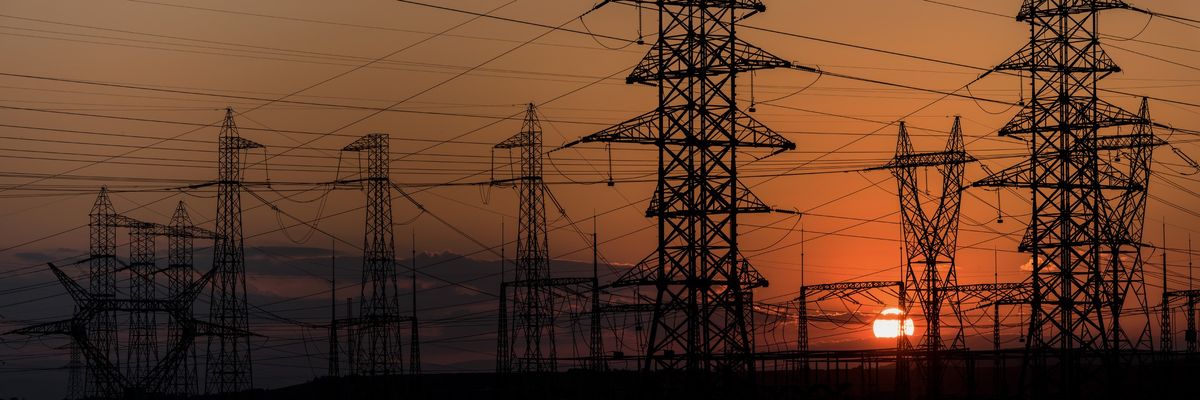Experts celebrated the "critical step to ensuring our electric grid has the capacity and durability necessary to keep up with our clean energy ambition, meet climate goals, and guarantee affordable and equitable energy access for all."

Electricity transmission lines are shown at sunset.
(Photo: Getty Images/iStock)
JESSICA CORBETT
May 13, 2024
COMMON DREAMS
Green groups on Monday praised U.S. regulators for finalizing rules that supporters say "will help accelerate the transition to a clean and equitable electric system by working to build more transmission capacity."
The two Democrats on the Federal Energy Regulatory Commission approved new transmission planning requirements. They and the sole GOP commissioner also advanced an order empowering FERC to greenlight permits for projects rejected or ignored by states.
"The new rules require utilities and regional grid operators to adopt 20-year plans that consider trends in technology and fuel costs, changes to resource mix and demand, more opportunities for state and utility collaboration, and extreme weather events, among other variables calculated by the 'best available data,'" the Union of Concerned Scientists (UCS) explained. The assessments must be revised every five years.
Sam Gomberg, the manager of transmission policy and a senior energy analyst at UCS, called the rules "a critical step to ensuring our electric grid has the capacity and durability necessary to keep up with our clean energy ambition, meet climate goals, and guarantee affordable and equitable energy access for all."
"I am pleased that FERC will require transmission planners to account for seven broadly recognized benefits of expanding transmission when determining whether to make investments," he said. "This, combined with FERC's inclusion of state-approved plans for utilities' changes in generation, moves the country to more just and reasonable planning standards."
Gomberg was far from alone in cheering the policy changes. Christine Powell, deputy managing attorney at Earthjustice and former commission adviser, said that "we applaud FERC for meeting the moment" and "look forward to engaging with FERC to center equity and environmental justice in transmission planning."
Cullen Howe, senior advocate with the Natural Resources Defense Council (NRDC) Sustainable FERC Project, stressed that "we urgently need every grid operator to determine where and what transmission lines to build. This rule brings everyone to the starting line for scaling up the clean energy transition."
"With climate-fueled disasters posing ever-greater challenges to the grid, this rule will help shape a power grid that optimizes the capabilities of clean energy while prioritizing reliability and affordability," Howe said. "In addition, FERC's backstop siting rule will help ensure that no one state can veto transmission lines that are in the general interest of the nation."
Quentin Scott, federal director for Chesapeake Climate Action Network, declared that "this announcement is a major leap forward to ease the bottlenecks that have slowed the clean energy revolution. These new federal rules will unleash the nearly 2000 gigawatts of clean energy in the transmission queue, putting us back on the pathway for 100% clean energy by 2035."
"When I talk with clean energy developers, their biggest challenge is certainty. The certainty of where they can build their projects, the certainty of how much their project will cost, and the certainty of their ability to connect to the grid. These latest FERC rules will provide that certainty," Scott added. He also urged Congress to "provide the financial incentives to expand transmission capacity."
"This rule will help shape a power grid that optimizes the capabilities of clean energy while prioritizing reliability and affordability."
Congress has already taken some action, as Sierra Club executive director Ben Jealous highlighted, pointing to the Inflation Reduction Act (IRA) signed by President Joe Biden in 2022. He said as that law "continues to usher in the clean energy future through deployment of solar, wind, and battery storage, this transmission standard will allow utilities to deliver Americans clean, affordable electricity, even in the face of rising demand and extreme weather caused by climate change."
Senate Majority Leader Chuck Schumer (D-N.Y.) and other top Democrats joined advocacy organizations in lauding the rules, enacted as global temperatures continue to soar, underscoring the need to transition away from planet-heating fossil fuels.
"The clean energy incentives included in the Inflation Reduction Act have been a huge success but much of that success would be lost without the ability to bring power from places that generate renewable energy to communities all across the country," said Schumer. "A new historic advancement in our transmission policies is desperately needed, and the rules released by FERC today will go a long way to solving that problem."
"Last year, I pushed FERC to deliver a historic advancement in transmission policies that will lower costs and improve reliability by getting clean energy from where it is produced to where people live," he continued. "This is exactly what we need to see the clean energy revolution we catalyzed with the Inflation Reduction Act come to fruition. FERC's actions will help to fundamentally improve our power grid in the wake of the IRA."
The Senate leader and green groups welcomed the rules, but "the commission's sole Republican member, former Virginia regulator Mark Christie, was not so effusive," notedHeatmap's Matthew Zeitlin. "He issued a harsh dissent to his colleagues' decision, likely previewing a judicial challenge from Republican-governed states."
"While the commission's chair, former District of Columbia Public Service Commissioner Willie Phillips, and its other member, NRDC alum Allison Clements, both Democrats, largely spoke about the rule in terms of reliability and reforming the planning process," Zeitlin reported, "Christie made it seem like a climate change policy in disguise that would function as a 'transfer of wealth' to wind, solar, and transmission developers."
No comments:
Post a Comment